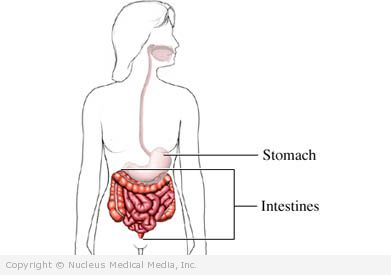(Roundworm)
Pinworm – Definition
Pinworms are very common parasites that live in the intestine.
Pinworms are most active at night, 2 to 3 hours after bedtime. The female worm comes out through the anus, and deposits eggs in the perineal area. The perineal area is between the thighs and runs from the anus to the genitals.
Pinworms are visible to the naked eye. They are about the size of a staple, yellow-white in color, and look like a fine piece of thread, which moves actively.
Pinworm – Causes
A small white worm called Enterobius vermicularis causes pinworm infection. A separate species also causing infection ( E gregorii) has been reported in England.
Pinworms are spread by accidentally eating the eggs of the worm that can be found on infected clothing, bedding, toys, or in the stool of an infected person (eg, diapers).
Pinworm – Risk Factors
A risk factor is something that increases your chance of getting a disease or condition. Risk factors include:
- Age: 5 to 14 years old
- Contact with an infected person (usually a child or family member of infected child)
- Contact with contaminated clothing, bedding, or object
- Regular exposure to schools, daycare centers, and other places where pinworms may be present
Pinworm – Symptoms
Symptoms may include:
- Itchy perineal area, worse at night
- Disturbed sleep
- Irritability
Symptoms may be worse at night. While the itching caused by pinworms can be very disturbing, pinworms do not otherwise cause serious medical illness. Many people infected with pinworms have no symptoms.
Pinworm – Diagnosis
When present, pinworms can frequently be seen in stool or on the skin around the anus. If pinworm infestation is suspected but no worms are seen, then the “tape test” is often employed.
To detect the presence of pinworms: Place a piece of clear adhesive tape over the anus, press, and remove. Repeat 2 to 3 times with new tape. Bring adhesive tape samples to the doctor, who will examine it for pinworms. Some laboratories supply special tape or “pinworm paddles” to use for this test.
The best time to do this test is 2 to 3 hours after bedtime, or before bathing in the early morning.
Pinworm – Treatment
If treatment is needed, pinworm infections are most commonly treated with prescription medications such as Albenza (albendazole) or Vermox (mebendazole), though pyrantel pamoate may also be used. Pyrantel pamoate is available over-the-counter under several names such as Pin-X, and PinRid. These agents should be avoided if you are or may become pregnant. Consult with your physician concerning therapy if you are or may become pregnant.
You should consult with your doctor to determine the most appropriate treatment. Medication is generally given in two or more doses, each separated by two weeks. To avoid reinfection, all members of the family should usually be treated.
After Treatment:
- Change underwear, nightclothes, and sheets after each treatment.
- Wash all bedding every 3 to 7 days for three weeks.
- Wash underwear and pajamas daily for two weeks.
- Wash all clothing and toys to destroy remaining eggs.
Pinworm – Prevention
To prevent pinworm infection:
- Always wash hands thoroughly after using the toilet, changing diapers, and before eating.
- Change and wash underwear daily.
- Bathe shortly after waking up to reduce egg contamination.
- Discourage nail biting and scratching anal areas.

